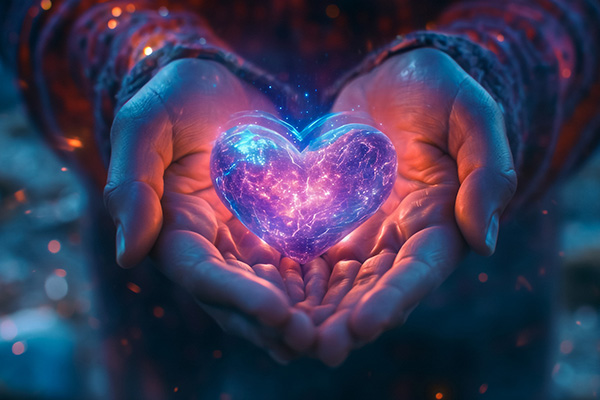self-acceptance
Your Sacred Center Of Self-Love
 We all thrive on being loved. This is natural, of course, if you look back at humanity in history on an evolutionary level. Ancient people came together in tribes, families, and groups, to cultivate a place of safety, security, nurturance, and love.
We all thrive on being loved. This is natural, of course, if you look back at humanity in history on an evolutionary level. Ancient people came together in tribes, families, and groups, to cultivate a place of safety, security, nurturance, and love.
If you were different or stood out in any way, or even left the tribe, you were literally putting your own life at risk. This topic can be viewed from so many arenas, including psychological, spiritual, scientific, and psychic.
I often wonder how and when did we start defining ourselves by how others felt about us, and why did we believe that other’s thoughts about us were true? At what point in time did we allow others to define us? It’s as though we as humanity went into a deep trance.
We all know the phrase, “Love thyself first”. When did we forget this vital piece of information?
There are many ways we can come back in touch with this essential truth, but for the most part, our society does not support a lifestyle that would naturally lead us back to our sacred center of self-love.
How often do you take a moment to look in the mirror, or tell yourself, “I love you?” Most of us feel silly doing this, but it is very healing.
Have you ever met an older person who behaves in ways that are foolish or who just doesn’t give a hoot what anyone else thinks? My paternal grandfather used to throw dinner rolls across the table at me in fancy restaurants. While my parents and other family seated at the table would roll their eyes at my Grampy, I used to laugh hysterically!
Not A People Person, Or Pleaser, And That’s Okay!
 I have had clients tell me that they feel something is wrong with them, because they don’t like to be around people. They prefer solitude.
I have had clients tell me that they feel something is wrong with them, because they don’t like to be around people. They prefer solitude.
Others feel disconnected when around people, or it makes them feel smothered. People make them feel drained, or they feel out of their element.
If you are someone that does not like to be around people, or feels a sense of disconnect when in large groups, or even just engaging with others, fear not! I have some very good news to share with you.
It is my hope and prayer that this information will help you to stop being so hard on yourself when it comes to your social preferences. You do not need to feel guilty for not wanting to slap on a “happy face” and pretend to be someone you are not.
There is nothing wrong with you in my opinion. There is a simple reason why you don’t enjoy being around other people so much. The reason is that you have been to this planet many times before and basically you have “been here done this,” as it were.
Okay, so you don’t feel like being around your fellow humans. What to do? Tell yourself this, “it is okay that I don’t want to engage with others.” Then tell yourself, “I love myself just the way I am and now see the beauty in me that I never did.
But instead of judging myself, or thinking there is something wrong with me, from this day forward I promise to allow myself to embrace the freedom of placing myself where I feel comfortable, and free, and at peace.” Continue reading
Give Yourself Permission To Be Happy!
 My life would be great if only… I had more money… he would come back to me.. I can find a better job… I can reach my goal weight.
My life would be great if only… I had more money… he would come back to me.. I can find a better job… I can reach my goal weight.
How many times have you heard such statements? How many times have you told yourself something like this? Is it truly the answer to lasting happiness? What if there was a way to train your brain to accept life and live your best in the meantime?
As a hypnotherapist, my experience has been that when any suggestion is put into the mind, the subconscious will accept the information, whether it is true or false.
Whatever a person chooses to tell themselves enough times becomes their truth. The information becomes a habit to believe the suggestion. Some habits are good and some not so good. A bad habit needs to be replaced with a good one.
Why not take all the positive steps needed to live your best in the meantime… while waiting for the wishes to come true. There are many ways to retrain the brain, just as there are many ways to travel to a destination.
Some people like the fastest route, while other like the scenic route, in order to see the sights along the way. It doesn’t really matter what route you take. What does matter is that you truly have the belief that you can reach the destination, and allow yourself to enjoy the ride in the meantime.
Always Remember That You Are Enough
 You are enough. If only, as we grew up, we had heard more such words, even if there was an additional “… and yet strive for more”.
You are enough. If only, as we grew up, we had heard more such words, even if there was an additional “… and yet strive for more”.
The fact is we were raised in a world where competition is prevalent; where our insecurities are often emphasized to us, or used as leverage (intentionally or otherwise); where our personal beliefs about ourselves potentially delays our soul evolution.
As partners in the Universe we say to ourselves, “Everything has a reason, we each have a soul purpose, all is in Divine Order.”
Yet, when a tragedy or life shattering moment hits, we are so intimately impacted that we have to dig deep to console ourselves and try to reframe that that tragedy has a Divine purpose, and that you have enough and are enough in that moment.
Perhaps such a life event is the loss of a family member, a loving relationship, job, pet, or a financial crisis, or any other life-changing event. Our faith in Divinity may keep us going, but it does not change the fact that we are deeply grieved by this loss.
Our ego will bring up all sorts of emotions, including anger, grief, betrayal, denial, hatred and many other emotions. You may espouse such things as, “Why them why not me” or “I feel cheated” and “How could this happen”.
In our Divine space, devoid of analytical ego, we know in our heart this experience is for our soul growth path and those closely connected with us, but that is still hard to face.
Reclaiming The Voice Of Your Inner Child
 I always sing with my yoga students at the end of class. I used to work in the entertainment industry as a singer, dancer, and actress. Because of that, I feel confident singing in front of people.
I always sing with my yoga students at the end of class. I used to work in the entertainment industry as a singer, dancer, and actress. Because of that, I feel confident singing in front of people.
Growing up, I was always full of joy despite my dysfunctional and rather glum family. Of course, they didn’t appreciate my natural exuberance. They certainly didn’t like that I sang all the time because it represented a lightness of being they had long since given up on.
Like many dysfunctional families, they put me down all the time. They told me that I couldn’t sing and that I sounded awful. But, as with all the other negative, hurtful things they tried to convince me of, I did not believe them.
I kept singing anyway, which irked them. I continued to sing and dance, and I even wrote, produced, directed, and starred in my own musical when I was eleven.
Now I’m not saying I had a good voice as a kid. I really don’t know if I did. But, loving to sing, some voice lessons and lots of joy certainly helped me become a relatively good singer.
One day, after my yoga class, a student came up to me and told me I had a beautiful voice. I thanked her. I often have people compliment my singing voice after class.
The student then told me her family told her she had a bad singing voice when she was a child so she stopped singing. She then mentioned other abuses she received by her cruel family.
The Magicless Misery Of ‘Compare And Despair’
 I once attended a Toastmasters meeting where a gentleman was delivering his first speech to this specific group. It was an ice breaker to have us get acquainted with him. Instead of the typical short autobiographical introduction this speaker chose to give us an overview of his philosophy of life.
I once attended a Toastmasters meeting where a gentleman was delivering his first speech to this specific group. It was an ice breaker to have us get acquainted with him. Instead of the typical short autobiographical introduction this speaker chose to give us an overview of his philosophy of life.
He told his audience that he sees himself entering a new phase of his life right now. He spoke about how important it is to get to know yourself and to take care of yourself first and foremost, and to always live in the moment.
After the speech and applause, the toastmaster reflected briefly on what the talk meant to him as he had listened. He said it reminded him of a mentor who had once, many years ago, said to him, “Compare… and despair”. If in life you are constantly comparing yourself to others, or comparing what you have with what others have, or what you feel you lack, or need to achieve, then all that will do is bring yourself unnecessary despair.
The only thing you should ever compare yourself against, his mentor added, is yesterday. Today did you do something constructive or grow in some way that makes you a better person than you were yesterday?
Too often we compare ourselves with our peers, both in our personal and professional lives. Why did he get a raise and not me? Why can I not find a soulmate like she did? Why can’t I be a successful entrepreneur like him? How come they get to have all these wonderful vacations?
Be The Light That Darkness Cannot Touch
 The nightmare continues every day. The very thing we fear the most has come to look us right in the face, staring in our eyes. This little imp taps us on the shoulder, reminding us of all the stupid things we did, all the hurtful things, how we messed up, time after time.
The nightmare continues every day. The very thing we fear the most has come to look us right in the face, staring in our eyes. This little imp taps us on the shoulder, reminding us of all the stupid things we did, all the hurtful things, how we messed up, time after time.
We messed up time again, no one agrees with us, we are reminded that “they” are so much smarter, did things exactly right every time.
We are at a turning point. We can give up, turn, run for the hills to hide, but still there is the demon of fear lingering around the deep recesses of our mind.
Surely this little devil of fear tells us we can see how we don’t deserve to reach our dreams, or accomplish our goals.
Stand back! Truly look at everything from all sides. Become like an eagle, or an owl, or a hawk, with eyes that see far beyond the surface where the heart lies.
Try to be kind and loving. Put your mind in the thoughts of being kind, being positive, no matter how much doing so lays open our heart for others to stomp on, even though many others will think you have lost your mind.
When we try with all our hearts to do something toward our dream, with love, with pure knowledge, we are listening to spirit. Then we gain strength, we gain courage, we pass over the top of the highest mountain to reach the other side. Let this outlook enlighten your heart, mind and soul toward a new attitude, for a new beginning.